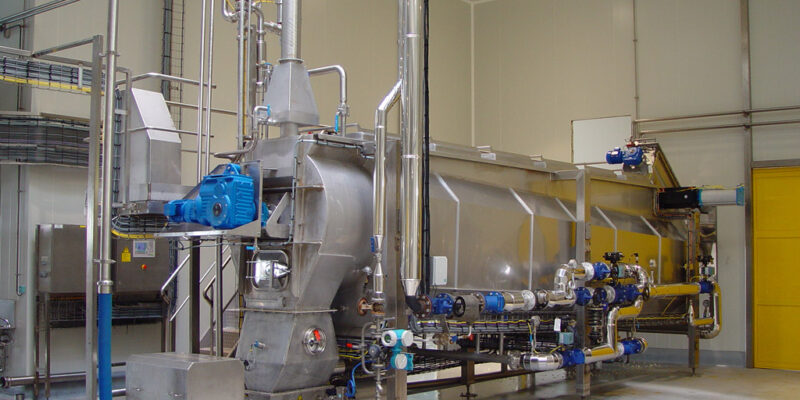FULL LINE FOR COOKING, PASTEURIZATION, AND STERILIZATION OF RED BEET AND POTATO
Thermal Process Systems has extensive experience in pasteurizing vegetables and potatoes. We have executed a broad range of projects for the potato industry, from simpler installations to fully automated and robotized lines that require very little labor. We have also supplied systems and developed recipes for a variety of vegetables, such as leek, endive, sweet potato, and most notably, red beetroot.
Aware of our expertise, a major Scandinavian producer of potatoes and red beets invited us to discuss advancing their processing capabilities. This customer has historically added a new step to their processing with each generation, evolving from farmers to packers, then to peeling and vacuum packaging, and now to the next stage: cooking. In the potato industry, cooking and pasteurization essentially serve the same purpose, as the potatoes are cooked during pasteurization. Additionally, the customer had a significant quantity of red beets and wanted to offer these products sterilized in pouches.
The initial phase of this project involved consulting with the customer about the process and the production setup required. Our experience significantly influenced the customer’s decisions. Based on these discussions, we determined the process steps, designed the factory layout, and ordered the necessary equipment.
Thermal Process Systems provided not only the autoclaves for pasteurizing and sterilizing the products but also managed the pre-packaging line where blanching and pre-cooking were performed. This planning was essential for the technological process, and our engineering team integrated the packing machinery.
The project’s general steps included transporting the machines, unloading them, placing them in their exact positions, connecting tubing, and running empty tests, all while the building was in the final stages of construction. Once the production hall was ready and energy was connected, real product testing began.
We conducted intensive product tests on various types of products, and a TPS specialist was onsite to assist the customer with recipe settings, consult on the results of pasteurization and sterilization values, and train the customer’s staff. This training included the normal production staff, the quality team, and the maintenance department to ensure the customer was completely independent and well-trained before we handed over the project for regular use.
While assisting the customer with their initial production, we were able to demonstrate the reasons behind certain choices, which clearly led to superior quality. For example, the red beets exhibited a good, homogeneous color due to controlled pre-cooking.
In this project, we also fine-tuned the cooling process, as we recognize that good and fast cooling definitely improves the final product. Opting to cool with both normal cooling tower water and chilled ice water for deeper cooling proved to be a wise choice. The customer now operates the line at full speed, delivering quality products to their satisfied consumers.

